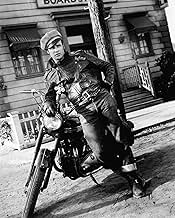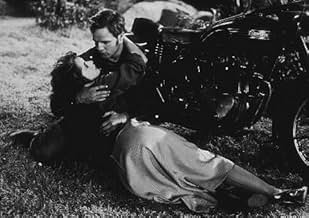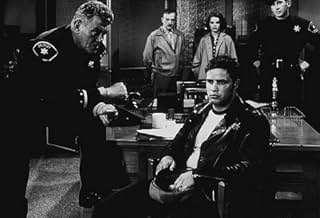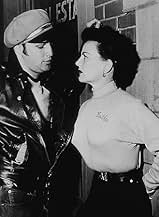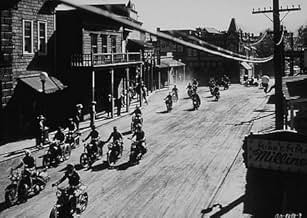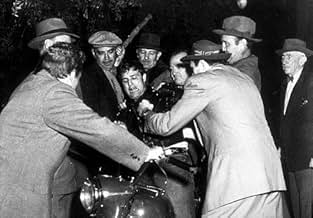Two rival motorcycle gangs terrorize a small town after one of their leaders is thrown in jail.Two rival motorcycle gangs terrorize a small town after one of their leaders is thrown in jail.Two rival motorcycle gangs terrorize a small town after one of their leaders is thrown in jail.
Wally Albright
- Cyclist
- (uncredited)
Chris Alcaide
- Deputy
- (uncredited)
Don Anderson
- Stinger
- (uncredited)
Robert Bice
- Wilson
- (uncredited)
- Director
- Writers
- All cast & crew
- Production, box office & more at IMDbPro
Storyline
Did you know
- TriviaThe Triumph motorcycle that Marlon Brando rides in the movie was his personal bike.
- GoofsAt the completion of the opening credits, when the view switches to the wide shot of the pack preparing to make a left turn, the lead bike (Johnny) already has the trophy tied to the headlight. Johnny isn't presented with the stolen trophy until a later scene at the races.
- Crazy credits[Opening credit] This is a shocking story. It could never take place in most American towns -- But it did in this one.
It is a public challenge not to let it happen again.
- ConnectionsEdited into Heavy Petting (1989)
Featured review
"Hey Johnny, what are you rebelling against ? -Whadaaya got ?"
This simple exchange sums up the spirit, or lack of , that inhabits the tumultuous heart of Johnny Stabler, the leader of the Black Rebel Motorcycle Club bikers riding like formerly the horsemen of the Apocalypse their Triumphs, or their triumph over a square alienating norm whose only trophy is defiance and suspicion. People see them as hoodlums, they define themselves as rebels but Johnny gives the perfect answer to the inevitable question. What have you got?
Indeed, there's nothing that doesn't invite to rebellion, it's not just being against the norm or the system but not even making a norm out of one's rebellion, the idea is simply to go, to escape from the conditioning and alienating effect of civilization. These guys aren't the baby boomers, they lived the War, they remember its effect on the elder, they inherited an America to rebuild, but the spirit was all lost in the greatest generation's souls. They're part of the rebirth of America and its conquering spirit, but only in the name of motorbikes, bottle of beers and rock'n'roll.
"The Wild One" directed by Laslo Benedek is the first of a trilogy that can be defined as the "Rebellious Youth of the 50's" followed by "Blackboard Jungle" and the the iconic "Rebel Without a Cause" (a title that could have fitted this one). James Dean's movie dealt with rebellion from an Oedipal point of view, showing the roots of the youth's unease, the absence of a true model to respect. "Blackboard Jungle" was more about the failure of education. But "The Wild One" shows the results without getting through their background, all we see is these kids in their 20's looking for vast landscapes for driving, bars where partying, and towns for terrorizing.
And the first two films have one thing in common, they start with the infamous headliners, you know these big words that don't take the viewer's intelligence for granted. Yes, we know the whole rhapsody; this lost youth is revealing of the failure of a system and let us pray for it will never happen again. Did we need that? I guess it's like the famous Cagney-Robinson movies in the 30's were people weren't used to see gangster playing the lead roles. Well, the 50's had to deal with rebellious minds, no less dangerous, except for the fact that they didn't cause trouble for money, they had no reason whatsoever to act like they did, they did because well, why not?
And the casting of Marlon Brando as the seminal rebellious kid is the film's masterstroke not just because of his iconic look, 2 years before James Dean with the leather jacket, the hat, and the Triumph, one of the most defining images of the 50's, there's more to that, there's Marlon Brando, there's this constant enigma engraved in his face. This is something I sensed in most of the characters he played in the 50's, we never exactly know what he thinks, what he feels, and most of the time, his character gets away with his secret. Johnny Stabler is no exception, he doesn't emerge from the group as a leader but as a natural outcast with one hell of an aura.
This is pure Brandonian detachment, and I love it. See how he subtly escapes from the gang as soon as he sees the beautiful Kathie (Mary Murphy), yes, it's obligatory romantic subplot but Brando elevates it to another dimension ever improving HER acting by the miracle of his presence. I suspect the moment she tried to get the capsule of his bottle and he took it away from her, was one of these improvisations he has the secrets. Brando plays everything, he's tough, sensitive, intriguing and fascinating. Ultimately, she despises his gang, but in no way, she can despise him because there is something incredibly attractive in that guy who doesn't enjoy attracting.
This is the rebellious attitude, a nihilistic escape in the world and within oneself, without coming back with no one on one's back. Stabler has no connection with the past, he never looks back, if he takes the girl, she's got to go with him, if he doesn't trust the cop, it's because he did before and it cost him a lot. Always moving forward . Is his motto, although when one of his gang friends is injured by an old man, observing the cute Kathie, he decides to stay. The townspeople try to accommodate with the gang but it's only a matter of time, and beer that the generation gap shows its limits, forcing the local councilman, Mary's meek father, to interfere. But the man is incapable to use his weapon, abandoning all the control to the angry mob lead by a local bully.
"The Wild One" isn't the subtlest script ever but I admire its straight-forward way to make its point in 80 minutes that feel longer, this is how thrilling it is. There is a bit of wilderness and soft-headedness in all of us, it's all about which button to press. Its primitive, simplistic, but for some reason it works and Brando is mainly the cause, but I wouldn't attribute all the merit to him, there is a stellar performance, from, Lee Marvin as his rival Chino, almost stealing the legend's show and an unrecognizably young Tim Carey as one of the hoodlums.
As simple as the film is, it'll be forever renowned for its iconic image of Brando and his indelible quote, enough to put it in the legendary 50's, a must-see definitely, a cult-classic or the Easy Rider of the 50's And Marlon Brando was born to be (the) Wild (one).
This simple exchange sums up the spirit, or lack of , that inhabits the tumultuous heart of Johnny Stabler, the leader of the Black Rebel Motorcycle Club bikers riding like formerly the horsemen of the Apocalypse their Triumphs, or their triumph over a square alienating norm whose only trophy is defiance and suspicion. People see them as hoodlums, they define themselves as rebels but Johnny gives the perfect answer to the inevitable question. What have you got?
Indeed, there's nothing that doesn't invite to rebellion, it's not just being against the norm or the system but not even making a norm out of one's rebellion, the idea is simply to go, to escape from the conditioning and alienating effect of civilization. These guys aren't the baby boomers, they lived the War, they remember its effect on the elder, they inherited an America to rebuild, but the spirit was all lost in the greatest generation's souls. They're part of the rebirth of America and its conquering spirit, but only in the name of motorbikes, bottle of beers and rock'n'roll.
"The Wild One" directed by Laslo Benedek is the first of a trilogy that can be defined as the "Rebellious Youth of the 50's" followed by "Blackboard Jungle" and the the iconic "Rebel Without a Cause" (a title that could have fitted this one). James Dean's movie dealt with rebellion from an Oedipal point of view, showing the roots of the youth's unease, the absence of a true model to respect. "Blackboard Jungle" was more about the failure of education. But "The Wild One" shows the results without getting through their background, all we see is these kids in their 20's looking for vast landscapes for driving, bars where partying, and towns for terrorizing.
And the first two films have one thing in common, they start with the infamous headliners, you know these big words that don't take the viewer's intelligence for granted. Yes, we know the whole rhapsody; this lost youth is revealing of the failure of a system and let us pray for it will never happen again. Did we need that? I guess it's like the famous Cagney-Robinson movies in the 30's were people weren't used to see gangster playing the lead roles. Well, the 50's had to deal with rebellious minds, no less dangerous, except for the fact that they didn't cause trouble for money, they had no reason whatsoever to act like they did, they did because well, why not?
And the casting of Marlon Brando as the seminal rebellious kid is the film's masterstroke not just because of his iconic look, 2 years before James Dean with the leather jacket, the hat, and the Triumph, one of the most defining images of the 50's, there's more to that, there's Marlon Brando, there's this constant enigma engraved in his face. This is something I sensed in most of the characters he played in the 50's, we never exactly know what he thinks, what he feels, and most of the time, his character gets away with his secret. Johnny Stabler is no exception, he doesn't emerge from the group as a leader but as a natural outcast with one hell of an aura.
This is pure Brandonian detachment, and I love it. See how he subtly escapes from the gang as soon as he sees the beautiful Kathie (Mary Murphy), yes, it's obligatory romantic subplot but Brando elevates it to another dimension ever improving HER acting by the miracle of his presence. I suspect the moment she tried to get the capsule of his bottle and he took it away from her, was one of these improvisations he has the secrets. Brando plays everything, he's tough, sensitive, intriguing and fascinating. Ultimately, she despises his gang, but in no way, she can despise him because there is something incredibly attractive in that guy who doesn't enjoy attracting.
This is the rebellious attitude, a nihilistic escape in the world and within oneself, without coming back with no one on one's back. Stabler has no connection with the past, he never looks back, if he takes the girl, she's got to go with him, if he doesn't trust the cop, it's because he did before and it cost him a lot. Always moving forward . Is his motto, although when one of his gang friends is injured by an old man, observing the cute Kathie, he decides to stay. The townspeople try to accommodate with the gang but it's only a matter of time, and beer that the generation gap shows its limits, forcing the local councilman, Mary's meek father, to interfere. But the man is incapable to use his weapon, abandoning all the control to the angry mob lead by a local bully.
"The Wild One" isn't the subtlest script ever but I admire its straight-forward way to make its point in 80 minutes that feel longer, this is how thrilling it is. There is a bit of wilderness and soft-headedness in all of us, it's all about which button to press. Its primitive, simplistic, but for some reason it works and Brando is mainly the cause, but I wouldn't attribute all the merit to him, there is a stellar performance, from, Lee Marvin as his rival Chino, almost stealing the legend's show and an unrecognizably young Tim Carey as one of the hoodlums.
As simple as the film is, it'll be forever renowned for its iconic image of Brando and his indelible quote, enough to put it in the legendary 50's, a must-see definitely, a cult-classic or the Easy Rider of the 50's And Marlon Brando was born to be (the) Wild (one).
- ElMaruecan82
- Jun 11, 2014
- Permalink
Details
- Runtime1 hour 19 minutes
- Color
- Aspect ratio
- 1.37 : 1
Contribute to this page
Suggest an edit or add missing content






